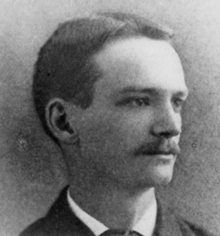Gamaliel Bradford VI (October 9, 1863 – April 11, 1932)[1] was an American biographer, critic, poet, and dramatist. Born in Boston, Massachusetts, the sixth of seven men called Gamaliel Bradford in unbroken succession, of whom the first, Gamaliel Bradford, was a great-grandson of Governor William Bradford of the Plymouth Colony. His grandfather, Dr. Gamaliel Bradford of Boston, was a noted abolitionist.[2]
Gamaliel Bradford VI | |
|---|---|
 | |
| Born | October 9, 1863 |
| Died | April 11, 1932 (aged 68) |
| Nationality | |
| Occupation | biographer |
| Spouse | Helen Hubbard Ford |
| Children | 2 |
| Signature | |
Early life
editIn 1886, Bradford married Helen Hubbard Ford. The couple would go on to have two children: Gamaliel Bradford VII (18 June 1888–8 August 1910), a Harvard graduate and Boston banker for Norman Wait Harris who died at 22 from suicide at the Kendall Hotel in Cambridge, Massachusetts, shooting himself after a young woman who was engaged refused to marry him instead;[3] and Sarah Rice Bradford (1 July 1892–September 1972).[4]
Bradford attended Harvard University briefly with the class of 1886, then continued his education with a private tutor, but is said to have been educated "mainly by ill-health and a vagrant imagination."[5] As an adult, Bradford lived in Wellesley, Massachusetts.
The building and student newspaper[6] for the Wellesley High School (where Sylvia Plath received her secondary school education[7]) were named after Gamaliel Bradford. The town changed the name of the building to Wellesley High School, but the newspaper maintains Bradford's name.
Career
editIn his day Bradford was regarded as the "Dean of American Biographers."[8] He is acknowledged as the American pioneer of the psychographic form of written biographies, after the style developed by Lytton Strachey.[9] Despite suffering poor health during most of his life, Bradford wrote 114 biographies over a period of 20 years.
He was friends with fellow Harvard University graduate and poet, George Faunce Whitcomb, as he inscribed the book, Jewels of Romance with the words: "To Gamaliel Bradford with deepest gratitude, George Faunce Whitcomb, Easter 1930, Brookline, Massachusetts".[10]
Death
editBradford died on April 11, 1932, in Wellesley, Massachusetts.[11]
Bibliography
edit- A Pageant of Life (poetry)
- A Prophet of Joy (poetry)
- Shadow Verses (poetry)
- Unmade in Heaven (drama), 1917.
- Lee, the American, 1912.
- American Portraits, 1875-1900
- Union Portraits, 1916.
- Confederate Portraits, 1914.
- Portraits of Women
- Portraits of American Women, 1919.
- Wives, 1925.
- Darwin, 1926.
- Saints and Sinners, 1932.
- A Naturalist of Souls: Studies in Psychography (reprinted in part from various periodicals), 1917.
- Life and I (autobiography)
- Elizabethan Women, 1936.
Articles
edit- "Government in the United States," The Contemporary Review, Vol. XLVIII, July/December 1885.
- "Municipal Government," Scribners, October 1887.
- "A Hero's Conscience: A Study of Robert E. Lee," The Atlantic Monthly, Vol. CVI, December 1910, pp. 730–39.
- "Journalism and Permanence," The North American Review, August 1915.
- "A Confederate Pepys," The American Mercury, December 1925.
References
edit- ^ "Gamaliel Bradford" Encyclopædia Britannica: History & Society:
- ^ Mathews, James W. (1991). "Dr. Gamaliel Bradford (1795-1839), Early Abolitionist" (PDF). Historical Journal of Massachusetts. 19 (1). Archived from the original (PDF) on September 19, 2017. Retrieved September 20, 2017.
- ^ "YOUNG BRADFORD A SUICIDE.; Gamaliel, 3d, Shoots Himself In Hotel -- Young Woman Refused to Wed Him". The New York Times. August 9, 1910. Retrieved April 26, 2024.
- ^ Bradford, Gamaliel VI. "Gamaliel Bradford VI Papers" (PDF). The Wellesley Historical Society. Retrieved April 26, 2024.
- ^ Braithwaite, William Stanley, ed.. Anthology of Magazine Verse for 1919: and Year Book of American Poetry. Small, Maynard & Company. 1919. p.301.
- ^ The Bradford Archived October 12, 2009, at the Wayback Machine
- ^ Alexander, Paul. Rough Magic: A Biography of Sylvia Plath.
- ^ "Bradford, Gamaliel". (2009). In Student Encyclopædia. Retrieved November 24, 2009, from Britannica Online for Kids. [1]
- ^ Colby, Frank Moore; Sandeman, George. Nelson's Encyclopaedia. p. 341.
- ^ Whitcomb, George Faunce (1922). Jewels of Romance. Boston: The G. R. Willis & Co., Inc. p. 3.
- ^ "Gamaliel Bradford Dies in Wellesley". The Boston Globe. Wellesley (published April 12, 1932). April 11, 1932. p. 17. Retrieved March 27, 2023 – via Newspapers.com.
- "Gamaliel Bradford" Encyclopædia Britannica: Online, student article; on-line source, accessed: May 4, 2007.
- Bradford, Gamaliel, 1863-1932. Correspondence: Guide; Houghton Library, Harvard College Library, Harvard University; on-line source, accessed: May 4, 2007.
External links
edit- Works by or about Gamaliel Bradford at the Internet Archive
- Works by Gamaliel Bradford at LibriVox (public domain audiobooks)
- Gamaliel Bradford letters at Columbia University. Rare Book & Manuscript Library.